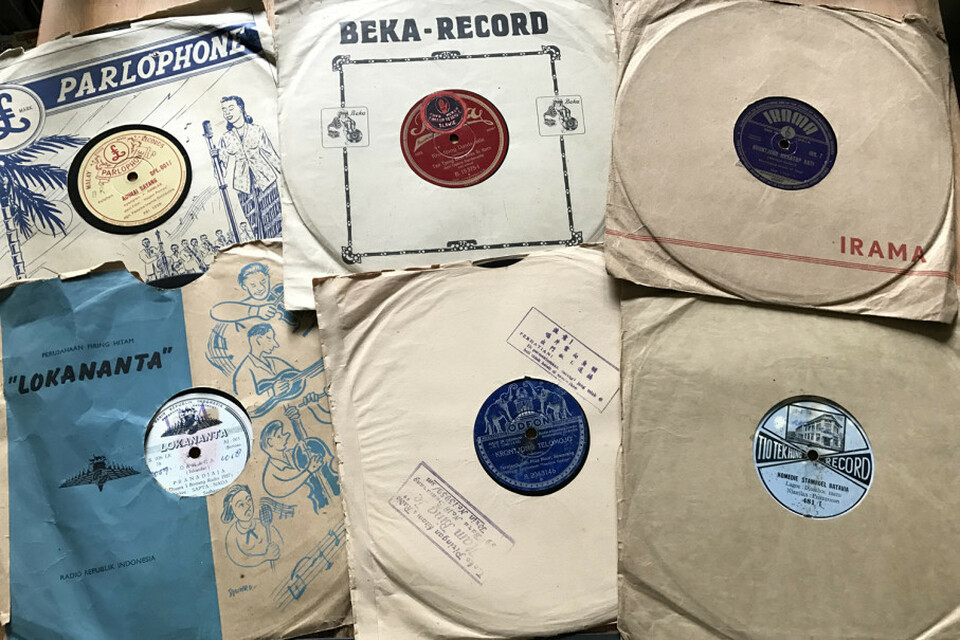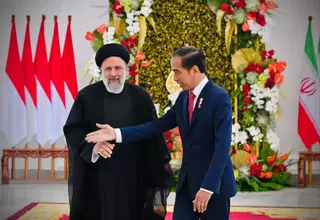'Papaja Mangga Pisang Djambu': Digging Nusantara History Through Old Pop Songs

Jakarta. Barely five years after Indonesia declared independence in 1945, right at the end of the Second World War, the country's art scene was booming, including its music industry.
According to Bandung-based music librarian, Budi Warsito, who spoke at a discussion on '50s Indonesian music and a gramophone listening party at indie bookshop Kios Ojo Keos in Lebak Bulus, South Jakarta, earlier this month, the 1950s was one of the most interesting periods in the development of Indonesian pop culture, especially for its intersection of music and cinema.
Indonesian pop music received a big boost with the emergence of locally-owned recording companies. The big names were Irama Record (yes, sans "s"), Dendang and Lokananta.
Their rosters included hit pop singers Sam Saimun, Oslan Husein, Hasnah Tahar, Herijati, Mien Sondakh and Ratna (famous for singing a Hawaiian jazz version of "Aksi Kutjing").
While pop was in the ascendant in Indonesia, in the United States the '50s witnessed the birth of a new musical genre we now know as rock ‘n’ roll.
Popularized by American disc jockey Alan Freed in 1951, the term rock 'n' roll was used to describe a new form of music that combined blues, country and gospel.
Rock journalist Robert Palmer said in an article in Rolling Stone that "rock 'n' roll was much more than new music. It was an obsession and a way of life."
Rock 'n' roll in Indonesia was known as "ngak ngik ngok," a term that, according to Budi, was already in use in local media by 1958.
Ngak ngik ngok found its apostles in Koes Bersaudara – Indonesia's own The Beatles – in the next turbulent decade, the '60s.
Rock 'N' Roll Rebels
Indonesia's first president Soekarno was a leftist who loved calypso, mambo and cha-cha-chá but detested ngak ngik ngok for spreading Western capitalist values.
In 1955, the president organized the Asia-Africa Conference which put Indonesia on the map of global politics as an emerging world power and initiator of the Non-Aligned Movement.
He also organized the short-lived Games of the New Emerging Forces (Ganefo) – a sporting competition for athletes from mostly newly decolonized countries in Asia and Africa, and his counter to the Olympic Games.
Eventually, in 1965, he withdrew Indonesia from the United Nations, the first member country to attempt to do so.
Before that, in 1963, Soekarno issued a presidential decree, the famous Panpres No. 11/1963, that banned ngak ngik ngok music and other forms of Western pop culture.
Under the rule, local musicians were not even allowed to cover Western pop songs, which they could still listen to freely on foreign radios such as ABC Australia, Hilversum Netherlands and the Voice of America.
Still, some artists did find ways to sneak bits of foreign music into their songs to avoid government censors.
Oslan Husein’s cover of Gesang's "Bengawan Solo" mashed up keroncong and Elvis Presley rock 'n' roll.
Sixties girl group Dara Puspita "sampled" the intro to The Rolling Stones' "(I Can’t Get No) Satisfaction" in their debut single "Mari-Mari" ("Come On, Come On").
Repression of Western-style pop music in Orde Lama (Old Order) Indonesia culminated in June 1965, when Indonesia's most popular rock 'n' roll band, "Koes Bersaudara," were thrown into prison for adding songs by The Beatles into their repertoire.
They were released only three months later, just one day before a military coup d'état that eventually deposed Soekarno and led to the mass killings of Indonesian communists.
Sounds of Nusantara
Where can we listen to these old Indonesian pop songs?
If you can't be bothered trawling through Blok M Square's specialist record shops for 78 rpm gramophone records of Sam Saimun (good luck!) or 7-inch Koes Bersaudara vinyl singles, you can go to... YouTube!
But if you want to rely less on serendipity and want to dig deep into Indonesian pop music history in a more systematic way, you might want to visit Irama Nusantara, an online library dedicated to preserving old recordings of Indonesian pop ditties.
Put together by a group of seven friends in 2013, Irama Nusantara collects and makes available dozens of recordings of various genres of Indonesian pop music spanning two decades, with the earliest dating back from the 1950s.
Irama Nusantara collects a wide range of classic Indonesian pop and rock songs by Dara Puspita, Koes Bersaudara, Elly Kasim and Bing Slamet among others, and all of them are available to stream for free.
If you're a history buff, you're in luck. The site also uploads scans of original album covers, inner sleeves and liner notes, where you can find the writing credits for each song.
Repro Indo Pop
If you're more into live renditions of these old pop songs, some contemporary bands, like Jakarta’s Deredia, have made a career out of covering '50s and '60s hits such as "Ayam Den Lapeh," "Nurlaila," "Hari Lebaran" and "Bersuka Ria."
On their YouTube channel, Deredia played jazz, rockabilly, ragtime, dixie and country versions of these songs.
Another band that took inspirations from old Indonesian pop songs and often performed them live is Nonaria, a Jakarta-based girl group known for their '50s-inspired indie hits "Tamasya," "Santai," "Maling Jemuran" and "Sebusur Pelangi."
At the Kios Ojo Keos event, Nonaria and Louise Sitanggang from Deredia played together, serenading the small but enthusiastic crowd with note-perfect renditions of "Nurlaila" by Bing Slamet and "Papaja Cha Cha" by Adikarso.
Tags: Keywords:POPULAR READS
Apple Wants to Increase Investments in Vietnam
Vietnam has become more important to Apple as the company seeks to diversify its supply chains away from China.China’s Top Diplomat Wang Yi to Visit Indonesia for Cooperation Talks
Chinese top diplomat Wang Yi will chair a policy coordination meeting aimed at strengthening Indonesia-China cooperation.President Jokowi Urges Global Restraint as Tensions Rise in the Middle East
President Joko "Jokowi" Widodo emphasized the importance of diplomatic efforts to prevent the escalation of conflict in the Middle EastKPK Identifies Sidoarjo Regent as Suspect in Corruption Probe
KPK has identified Ahmad Muhdlor Ali as a suspect in a corruption case involving the Sidoarjo Regional Tax Service AgencyEconomic Concerns Overshadow Security Worries for Indonesians in Iran
Indonesian citizens currently in Iran are more concerned about rising inflation than the security situation in the country.Popular Tag
Most Popular






















